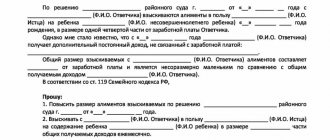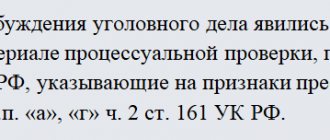Legislative regulation
All legal issues related to this document are regulated by criminal procedure legislation. In particular, the Code of Criminal Procedure provides a definition from which several conclusions can be drawn:
- The document represents a person’s obligation to constantly remain in the territory of his place of residence, as well as to appear at the first request of all participants in the investigation.
- The citizen also undertakes the obligation not to interfere in any way with the investigation or the judicial process.
- Signed by the suspect or accused.
- These participants mean not only the investigator himself, but also the court, the investigator and the prosecutor.
Thus, signing the document is aimed at preventing the suspect from:
- Hide from investigation.
- Continue to commit illegal, criminal acts.
- Assist accomplices, influence witnesses, etc.
It should be understood that a written undertaking not to leave is a citizen’s right, but not his obligation. That is, the investigator, prosecutor and other participants in the proceedings cannot insist that this document be signed and the suspect undertake the corresponding obligations.
However, in practice, investigators almost always choose this measure if there are objectively no grounds for detention and imprisonment in a pre-trial detention center. That is, in fact, a practice has developed in which no one asks for the consent of a citizen, which does not comply with the Constitution. The corresponding ruling was made by the Constitutional Court of the Russian Federation.
Issuance procedure
According to the legislation in force in Russia in 2022, the procedure for issuing this preventive measure consists of several stages (Article 101 of the Code of Criminal Procedure of the Russian Federation):
- Adoption of a resolution (by the investigator) or a ruling (by the court) regarding the choice of a recognizance not to leave as a preventive measure.
- Drawing up the text of a document that indicates the type of criminal act and the grounds for issuing a recognizance not to leave a person.
- Announcing this decision to the suspect or accused.
- Explaining to the citizen the conditions and grounds specified in the document. If this step is skipped, the suspect or accused can issue a waiver.
- Explaining to the person the procedure for appealing the decision to apply the specified preventive measure.
- Signing of a document by a citizen to whom it applies. This procedure takes place in the presence of authorized bodies and parents, guardians or guardianship authorities if the signatory is a minor.
Is it possible not to sign a written undertaking not to leave? It is undesirable to do this, otherwise another measure of restriction of freedom will be applied.
If you categorically disagree with this decision, go to court with a corresponding complaint.
Undertaking not to leave the place: alternative options
If a citizen understands that for some reason he cannot agree with a written undertaking not to leave (he needs to visit a relative in the near future, etc.), he can try to change this preventive measure. There are 2 alternative options:
- In the document itself, ask in writing to leave at a certain time and to a certain place, justifying your request, for example: “due to the need to visit a seriously ill relative.”
- Make a petition asking the investigator to choose a different measure. For example, an obligation that a citizen will appear upon first demand in court or before an investigator (i.e., an obligation to appear in person).
These two documents are significantly different from each other. The main difference is that the accused, who has given his undertaking to appear, can move freely throughout the country and beyond, but must appear at the first request of the investigator.
| comparison criterion | House arrest | obligation to appear |
| norm of the Code of Criminal Procedure | 102 | 112 |
| essence | obligation not to leave your place of residence without permission | obligation to appear at first request in court or before an investigator |
| to whom it applies | only the suspect or accused | all participants - including all witnesses, as well as the plaintiff (victim) |
| liability for violation | arrest in custody | forced drive |
What consequences await violators?
If you signed the document we are considering today, then your task is to comply with all the requirements specified in it. If you failed to do this, you will have to face the severity of the consequences.
Officials will separately explain what consequences await you at the stage of presenting the requirement to sign the paper of interest to us.
- Thus, one of the punishment measures in the situation we are considering could be the replacement of such a preventive measure as a written undertaking not to leave the place with a more severe one - house arrest . The consequence of house arrest is a ban on leaving the immediate walls of your apartment or house, depending on where you live. Agree, much more inconvenient than a simple recognizance not to leave.
- The second preventive measure will be much more stringent than what we just mentioned in the first paragraph. So, we are talking about taking a violator of official promises into custody directly within the walls of a government agency. Simply put, you will be escorted to jail, where you will spend time until the next court hearing, or even for many years, provided that you are convicted. So why rush there?
Typically, the more stringent measures mentioned above are administered in the following order:
- first, house arrest is imposed;
- if the requirement to remain constantly within the walls of the apartment is violated, the person can be sent to jail, since only in this way can government agencies be sure that this citizen will not abscond from justice.
Validity
The deadlines are determined by the legal status of the citizen in this criminal proceeding:
- If he is an accused , then he is prohibited from leaving his home for the entire period of the investigation and trial, until the verdict is announced (or the citizen is taken to a pre-trial detention center).
- If he is a suspect (i.e., no specific charges have been made at the moment), then it is valid for only 10 calendar days. Moreover, if after this time no charges are brought, the document loses its validity.
NOTE. The entire period of stay under recognizance not to leave does not count towards the possible term of punishment (unlike, for example, detention in a pre-trial detention center or under house arrest).
What obligations are imposed on the person under investigation?
A recognizance not to leave presupposes the imposition of restrictions on free movement, recorded in the relevant document. The person from whom such a subscription is taken undertakes:
- Do not travel outside the locality in which the citizen lived at the time the preventive measure was taken. It does not matter whether the place of residence is permanent or temporary. The territories where you cannot travel include all areas outside the locality in which the person under investigation lives. This is the only restriction; otherwise, the citizen continues to lead a normal life. However, the above does not mean that the place of residence cannot be left under any circumstances. If necessary, the investigative body or the court may allow departure from the settlement for a certain time. To ensure that law enforcement officers do not have any further claims against the suspect, it is recommended that permission be issued in writing, indicating the time of departure and arrival, as well as the address of the place visited. Otherwise, departure will be recognized as a gross violation of the preventive measure.
- If called by an investigator, inquiry officer or court, a citizen must appear at the relevant institutions strictly at the appointed time. Notification of the need to appear is carried out by means of a summons or other document. Failure to appear when called may be grounds for tightening the preventive measure.
- Do not commit any actions aimed at obstructing the administration of justice. As a rule, such a lenient measure is not prescribed for those repeatedly convicted of serious crimes.
Risks for the suspect
It is important for a citizen to understand that in practice he may encounter many difficulties, including those related to the imperfection of the law enforcement system.
For example, the exchange of data between different bodies does not always take place on the same day, so the decision of an official or body does not actually come into force at the same moment. Therefore, it is worth keeping in mind the possible risks associated with a recognizance agreement:
- Article 102 of the Code of Criminal Procedure allows for a general formulation that a citizen does not have the right to interfere in any way with the investigation. Since the statement is given without specific descriptions, it is better for the suspect, and especially the accused, to exclude any contact with witnesses , their relatives, loved ones and other people who in one way or another can influence the course of the process.
- While under subscription, any movement actions must be coordinated with the investigator , and as a result of the agreement, it is important to obtain his written permission. Otherwise, for example, the following situation may arise. The citizen called the investigator, who gave verbal permission, but the suspect was detained at the airport or train station and formally justifiably taken into custody.
- If you are not confident in the correct understanding of the law and the practice of law enforcement agencies, it is best to seek legal assistance from a lawyer.
Is it possible to legally leave my place of residence?
One of the frequently asked questions is whether a person under recognizance not to leave can travel to another city?
If it becomes necessary for a person to travel to another city, he must submit a written application to the official conducting the proceedings.
Such an application must include the following information:
- The name of the body and official who has the authority to resolve this issue;
- Information about the person who applied;
- Information about departure dates;
- List of reasons for departure;
- If available, a link to evidence confirming the validity of the reasons for departure.
Upon receipt of a positive decision, upon arrival in another populated place, a person must contact a law enforcement agency to obtain a mark of arrival. Failure to receive it can be considered an attempt to escape.
Responsibility for violation of obligations not to leave
If it has been established that the suspect has violated his obligations, other, more stringent measures may be applied to him, which will remain in effect until the end of the investigation:
- confinement at home (house arrest);
- imprisonment in a pre-trial detention center.
Of course, illegal actions committed by the suspect during this period will be interpreted by the court as aggravating circumstances. Therefore, the sentence will naturally be tougher.
Video commentary on how you can legally leave your home while your subscription is valid:
Possibility of using technical means to control persons under investigation
To control the movement of persons subject to certain restrictions, it is advisable to use technical devices that allow them to track their location remotely. They can be electronic bracelets that transmit a signal via GPS.
In the Russian Federation, such a system has not yet been implemented, although it is actively used in a number of other countries. However, the legislation of our country allows the use of electronic and technical means to monitor the behavior of persons sentenced to restriction of freedom. It seems advisable to use them for citizens under recognizance not to leave. This will prevent cases of them evading investigative actions and justice.
Early lifting of restrictions
If there are motivated and justified reasons, the undertaking not to leave may be canceled or changed to another preventive measure. This decision is made on the basis of a citizen’s application by a judicial authority or the prosecutor’s office.
The request is granted in several cases:
- If during the investigation the innocence of the accused or suspect is established;
- There is no need for constant monitoring.
The corresponding resolution is written in 2 copies . One of them is issued to the citizen, the second remains with the prosecutor in charge of the case.
As practice shows, operational services do not always receive relevant information on time. In order to avoid various problems, it is better to keep the decision to lift the preventive measure for some time (especially for those who are going abroad).
Now you know what a written undertaking not to leave means and what obligations it imposes. If you are not sure about the correctness of the decision, seek qualified legal assistance.
Conditions for early lifting of a preventive measure
If there are justified and motivated reasons, the preventive measure may be changed or canceled altogether. The decision is made by the prosecutor's office or judicial authority based on the citizen's application.
If there is a need for revocation, and during the investigation, innocence has already been established, or the restriction of movement has become irrelevant, the petition is granted. To confirm the cancellation, the citizen is issued a corresponding resolution, one copy of which is kept by the prosecutor involved in the case under consideration.
Current legislation
The justification for choosing this sanction is established by Article 97 of the Criminal Procedure Code of the Russian Federation. It is stated here that courts, investigators and interrogators can use this preventive measure in situations where a citizen is able to:
- Hide from criminal prosecution;
- Will continue to commit illegal acts;
- It will interfere with legal proceedings or investigative measures.
It should be clarified that the concept of a recognizance not to leave presupposes an abstract preventive effect. This is due to the fact that if the investigative authorities had good reason to believe that a citizen could actually escape criminal prosecution, more stringent sanctions would be applied, for example, arrest and placement in a detention center. Moreover, when assigning such a punishment, the severity of the crime committed, age indicators and the presence/absence of diseases, his marital status and other circumstances are always taken into account.
Undertaking not to leave the Criminal Procedure Code
Legal definition of the concept
Let's start with the fact that a written undertaking not to leave is recognized as an exclusively mild coercive measure, which is assigned to persons suspected/accused of committing a crime. The essence of such a sanction is the imposition of certain restrictions that determine freedom of movement and the fulfillment of other obligations.
In particular, the document may provide for compliance with the following conditions:
- Prohibition to leave the populated area without informing the authorized authorities;
- Appearing for questioning or for other procedural actions upon first summons;
- Lack of opposition to the investigation or inquiry;
- Prohibition on contact with victims and witnesses.
Important! A subscription prohibiting travel does not limit a person’s freedom in the full sense of the word. People under the subscription continue to go to work, can have fun and move freely around the city, without going beyond what is permitted.








